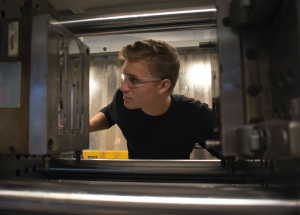 Winona State University’s Composite Materials Engineering Program has added more than $1 million worth of state-of-the-art equipment in the last year.
Winona State University’s Composite Materials Engineering Program has added more than $1 million worth of state-of-the-art equipment in the last year.
The new equipment includes: a Markforged Mark Two 3D printer; a McClean Anderson filament winding machine; TA Instruments TGA, TMA, DSC, and rotational rheometer; a Shimadzu FTIR; a FEI Q250 scanning electron microscope (SEM) with energy dispersive x-ray spectroscopy (EDS) capability; Instron Universal Testing System, Dynamic and Fatigue Testing System, and Melt Flow Tester; and a Milacron Magna T55 injection molding press.
Students, faculty and staff use the equipment in courses and labs, for research, and for projects taken on by the Composite Materials Technology Center (COMTEC) (https://www.winona.edu/engineering/comtec.asp), which is an industry-university partnership that serves simultaneously to foster interaction with industry and enhance engineering education.
Partnerships also helped fund the acquisition of the new equipment. Half of the funding for almost every piece of equipment was provided through the Minnesota State Leveraged Equipment Funding Program, with the remaining funds provided by the respective equipment manufacturers or, in the case of the 3D printer, the Society of Plastics Engineers (SPE) Composites Division. Only the injection molding press was purchased using differential tuition funds from students enrolled in the CME major.
According to CME Department Chair Fariborz Parsi, having access to and training on the equipment gives WSU students the hands-on experience they need to be competitive in the industry when they graduate.
“Our programs offer hands-on learning in partnership with the composites industry,” said Dr. Parsi. “We combine classroom and laboratory experience, internship, and applied research to prepare graduates who can apply their knowledge and expertise to develop innovative and effective solutions for the composites industry.”
The Composite Materials Engineering program at WSU enrolls around 50 new students each year and is accredited by the Engineering Accreditation Commission of the Accreditation Board for Engineering and Technology, Inc. (ABET). The program, which is the only undergraduate program in the United States that offers a bachelor of science degree in composite materials engineering, has been recognized as one of the Top 50 Most Affordable Engineering Programs in the U.S. https://www.collegeaffordabilityguide.org/subjects/engineering/
